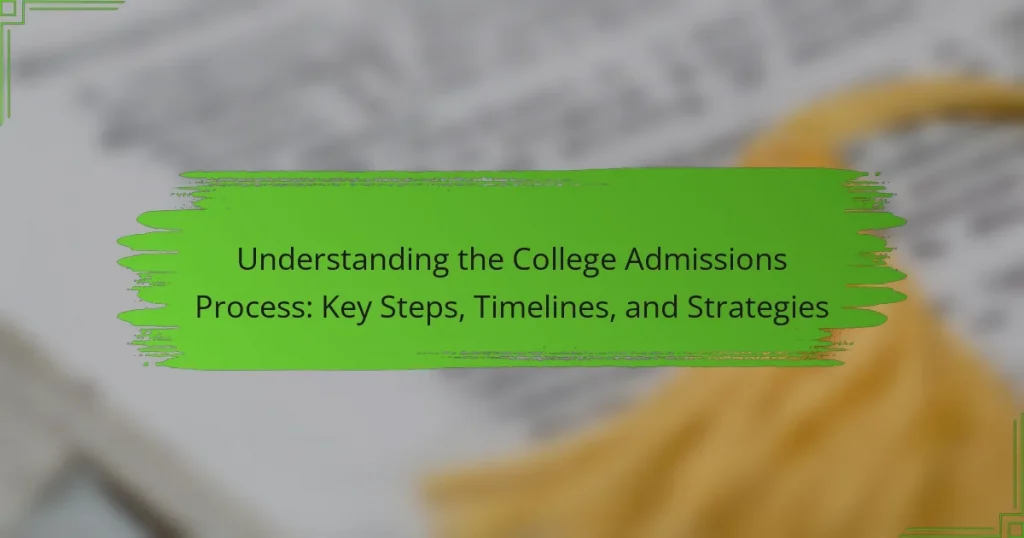
What is the College Admissions Process?
The college admissions process is the procedure through which students apply for admission to colleges or universities. It typically involves several key steps, including researching schools, preparing applications, and submitting required materials. Students often need to provide transcripts, standardized test scores, and letters of recommendation. Additionally, personal essays or statements are commonly required to showcase the applicant’s personality and goals. Deadlines for applications can vary by institution, with early decision and regular decision options available. The process culminates in admissions decisions, where schools notify applicants of their acceptance or rejection. According to the National Association for College Admission Counseling, nearly 70% of high school graduates enroll in college within a year of graduation, highlighting the importance of understanding this process.
How does the College Admissions Process work?
The college admissions process involves several key steps that students must follow to gain acceptance into a college or university. It typically begins with researching schools and understanding their requirements. Students then prepare for standardized tests, such as the SAT or ACT, which many colleges require.
Next, students complete applications, which often include essays, transcripts, and recommendation letters. After submitting applications, students may be invited for interviews or campus visits. Finally, admissions committees review applications and make decisions based on academic performance, extracurricular activities, and personal statements.
The timeline usually starts in the junior year of high school, with applications submitted in the fall of senior year. Acceptance notifications typically occur in the spring. According to the National Association for College Admission Counseling, over 3 million students applied to colleges in the U.S. in 2021, highlighting the competitive nature of the process.
What are the key components of the College Admissions Process?
The key components of the college admissions process include application submission, standardized testing, recommendation letters, personal essays, and interviews. Applicants must complete and submit their applications by specified deadlines. Many colleges require standardized test scores such as the SAT or ACT. Recommendation letters from teachers or counselors provide insights into the applicant’s character and achievements. Personal essays allow applicants to express their individuality and motivations. Some colleges also conduct interviews to further assess candidates. These components collectively help institutions evaluate applicants holistically.
How do these components interact within the College Admissions Process?
The components of the college admissions process interact through a systematic evaluation of applicants. Admissions committees assess academic performance, standardized test scores, extracurricular activities, and personal essays. Each component contributes to a holistic view of the applicant. Academic performance provides insight into the student’s readiness for college-level work. Standardized test scores offer a comparative measure of academic ability. Extracurricular activities highlight the student’s interests and engagement outside the classroom. Personal essays allow applicants to express their individuality and motivations. Together, these components help colleges determine fit and potential success within their programs. The interaction among these factors ultimately guides the decision-making process in admissions.
Why is understanding the College Admissions Process important?
Understanding the College Admissions Process is important because it directly impacts a student’s opportunities for higher education. Knowledge of this process helps students identify suitable colleges. It also enables them to meet application deadlines and requirements. Familiarity with admission criteria can enhance a student’s application quality. Statistics show that well-informed applicants have higher acceptance rates. For instance, students who understand the importance of recommendation letters often secure stronger endorsements. Additionally, awareness of financial aid options can alleviate the cost burden. Overall, grasping the admissions process equips students for success in their educational pursuits.
What are the potential outcomes of a successful College Admissions Process?
A successful college admissions process can lead to several positive outcomes. First, students gain acceptance into their desired college or university. This acceptance can provide access to quality education and resources. Second, students often receive financial aid or scholarships, reducing the cost of attendance. Research indicates that 85% of college students receive some form of financial aid. Third, successful admissions can enhance a student’s career prospects. Graduates from reputable institutions tend to have higher employment rates. Finally, a successful admissions process can lead to personal growth and networking opportunities. Students often build lifelong connections with peers and faculty. These outcomes collectively contribute to a student’s academic and professional journey.
How does knowledge of the College Admissions Process benefit applicants?
Knowledge of the College Admissions Process benefits applicants by enhancing their preparedness and strategic approach. Understanding key timelines allows applicants to meet deadlines effectively. Familiarity with application requirements helps in assembling necessary documents. Knowledge of admission criteria aids in tailoring applications to specific colleges. Awareness of financial aid options enables informed decisions about funding education. This comprehensive understanding increases the likelihood of acceptance into desired institutions. Research shows that applicants who are well-informed about the admissions process tend to submit stronger applications. This ultimately leads to better outcomes in college admissions.

What are the key steps in the College Admissions Process?
The key steps in the college admissions process include researching colleges, preparing for standardized tests, completing applications, and submitting required documents. Researching colleges helps students identify institutions that fit their academic and personal preferences. Preparing for standardized tests, such as the SAT or ACT, is crucial for meeting admission requirements. Completing applications involves filling out forms, writing essays, and gathering recommendation letters. Finally, submitting required documents, including transcripts and test scores, is essential for a complete application. Each of these steps is vital for a successful college admission experience.
What are the preliminary steps before applying to college?
The preliminary steps before applying to college include researching colleges and understanding their admission requirements. Students should create a list of potential colleges based on their interests and career goals. They must also evaluate each college’s application deadlines and specific criteria. Gathering necessary documents, such as transcripts and recommendation letters, is essential. Additionally, students should prepare for standardized tests, like the SAT or ACT, as many colleges require them. Finally, creating a timeline for completing each application component ensures a smooth process.
How can students prepare academically for college applications?
Students can prepare academically for college applications by maintaining strong grades and taking challenging courses. They should focus on core subjects such as math, science, and English. Advanced Placement (AP) or International Baccalaureate (IB) courses can enhance their academic profile. Students should also engage in extracurricular activities that demonstrate leadership and commitment. Regularly studying for standardized tests like the SAT or ACT is essential. Seeking help from teachers or tutors can improve understanding of complex subjects. Participating in academic clubs or competitions can further showcase their skills. These actions collectively strengthen a student’s college application.
What role do extracurricular activities play in the College Admissions Process?
Extracurricular activities play a significant role in the college admissions process. They demonstrate a student’s interests, skills, and commitment outside of academics. Colleges seek well-rounded applicants who contribute to campus life. Participation in clubs, sports, or volunteer work showcases leadership and teamwork abilities. According to the National Association for College Admission Counseling, 75% of colleges consider extracurricular involvement as a factor in admissions decisions. This involvement can also enhance a student’s application by providing unique narratives in personal statements. Ultimately, extracurricular activities help differentiate candidates in a competitive admissions landscape.
What are the essential steps during the application phase?
The essential steps during the application phase include researching colleges, preparing application materials, and submitting applications. Researching colleges involves identifying institutions that align with academic and personal goals. Preparing application materials requires gathering transcripts, recommendation letters, and personal statements. Submitting applications must be done by the specified deadlines for each college. Each college may have unique requirements, so it is crucial to follow their specific guidelines. Additionally, applicants should track their submissions and confirm receipt by the colleges. This organized approach ensures that all elements of the application are completed accurately and on time.
What documents are typically required for college applications?
College applications typically require several key documents. These documents include a completed application form. Most colleges use the Common Application or their own specific application. Applicants must also submit high school transcripts. These transcripts should reflect all completed coursework and grades. Standardized test scores are often required, such as SAT or ACT results. Letters of recommendation from teachers or counselors are also typically necessary. A personal statement or essay is commonly requested as well. Finally, some colleges may require a resume detailing extracurricular activities and achievements.
How should students approach writing personal statements and essays?
Students should approach writing personal statements and essays by starting with a clear understanding of their purpose. These documents showcase individuality and reflect personal experiences. Students should brainstorm ideas that highlight their strengths and unique qualities. They must also consider the audience and tailor their writing accordingly. A strong opening can capture attention, while a coherent structure enhances readability. Students should use specific examples to illustrate their points effectively. Revising and seeking feedback is crucial for improving clarity and impact. A well-crafted personal statement can significantly influence admissions decisions.

What are the timelines associated with the College Admissions Process?
The college admissions process typically follows a timeline that spans over a year. Most students start preparing in their junior year of high school. Application deadlines usually occur between November and January for early decision and regular decision cycles. Standardized test scores are often required by the end of the fall semester. Financial aid applications, like the FAFSA, are typically due in the spring. Admission decisions are generally released between March and April. Students must confirm their enrollment by May 1. Each college may have specific variations to these timelines, but this general framework is widely applicable.
When should students start preparing for college admissions?
Students should start preparing for college admissions in their sophomore year of high school. This timeline allows students to build a strong academic record. They can also begin exploring extracurricular activities at this stage. Starting early helps students identify their interests and strengths. Additionally, students should consider standardized test preparation during this time. Research indicates that early preparation leads to better college outcomes. According to the National Association for College Admission Counseling, students who plan ahead are more likely to meet application deadlines successfully.
What is the timeline for standardized testing?
Standardized testing typically occurs during a student’s high school years. Most students take their first standardized tests, such as the SAT or ACT, in their junior year. Testing dates are often scheduled in the fall and spring. Many students opt to retake these tests in the spring of their junior year or the fall of their senior year. Colleges generally expect standardized test scores to be submitted by early application deadlines, which are usually in November. Final scores should ideally be sent by December for regular admissions. This timeline allows students to align their test-taking with college application deadlines effectively.
How does the timeline differ for early decision versus regular decision applications?
Early decision applications have an earlier timeline compared to regular decision applications. Typically, early decision deadlines are in early November. Applicants receive their admission decision by mid-December. In contrast, regular decision deadlines usually fall in January. Regular decision applicants typically receive their decisions by late March or early April. This difference in timelines allows early decision applicants to secure a spot sooner, while regular decision applicants have more time to prepare their applications.
What should students expect after submitting their applications?
Students should expect a confirmation of their application submission. Most colleges send an email or notification confirming receipt. This confirmation typically arrives within a few days. After that, students may wait for further communication regarding their application status. Colleges may provide timelines for decisions. Students should also prepare for potential interviews or additional materials requests. Regularly checking the application portal is advisable. This helps students stay updated on their application progress.
How long does it typically take to receive admission decisions?
Admission decisions typically take between four to six weeks after the application deadline. This timeframe can vary based on the institution and the volume of applications received. For example, many colleges aim to notify applicants by mid-March for regular admissions. Some may provide earlier decisions for early action or early decision applicants. Institutions often communicate their specific timelines on their websites. This ensures applicants know when to expect their results.
What steps should students take after receiving admission offers?
Students should carefully evaluate their admission offers. They must compare the financial aid packages from each institution. This includes scholarships, grants, and loans. Students should also consider the academic programs offered. They need to assess the campus environment and location. Visiting campuses can provide valuable insights. Students should consult with family and mentors for guidance. Finally, they must make a decision and formally accept the chosen offer by the deadline.
What strategies can enhance success in the College Admissions Process?
To enhance success in the college admissions process, students should focus on several key strategies. First, they must maintain a strong academic record. High GPA and challenging coursework demonstrate readiness for college-level work. Next, students should engage in extracurricular activities. Participation in clubs, sports, or volunteer work showcases leadership and commitment.
Additionally, preparing for standardized tests is crucial. Achieving high scores on the SAT or ACT can significantly impact admissions decisions. Crafting a compelling personal statement is also essential. A well-written essay allows students to express their unique qualities and experiences.
Seeking strong letters of recommendation is another vital strategy. Recommendations from teachers or mentors who know the student well can provide valuable insights into their character. Finally, researching colleges thoroughly can help students find the best fit. Understanding each school’s culture, programs, and requirements aids in making informed choices.
These strategies collectively improve a student’s chances of gaining admission to their desired colleges.
How can students effectively research colleges to find the right fit?
Students can effectively research colleges by identifying their priorities and utilizing various resources. First, they should define what factors are important, such as location, size, and academic programs. Next, they can use college search engines like College Board and Niche to filter options based on these criteria. Visiting college websites provides detailed information about programs and campus life. Additionally, students should attend college fairs and information sessions to interact with representatives. Speaking with current students can offer firsthand insights into the college experience. Finally, comparing schools using a pros and cons list can help clarify their choices. Research shows that students who actively engage in this process are more likely to find a college that aligns with their personal and academic goals.
What are some best practices for managing application deadlines and requirements?
To effectively manage application deadlines and requirements, create a detailed timeline. This timeline should include all important dates such as application deadlines, recommendation submission dates, and standardized test dates. Utilize a checklist for each application to track required documents and tasks. Regularly review and update this checklist to ensure nothing is missed. Set reminders for upcoming deadlines to stay organized. Communicate with recommenders and ensure they are aware of their deadlines. Additionally, prioritize applications based on deadlines and personal interest. According to the National Association for College Admission Counseling, early planning significantly reduces stress and increases the likelihood of meeting all requirements.
The main entity of this article is the college admissions process, which encompasses the steps students take to apply for admission to colleges or universities. Key components include researching schools, preparing applications, submitting required materials such as transcripts and standardized test scores, and writing personal essays. The article outlines essential timelines, from initial preparation in the junior year of high school to application submission deadlines and the subsequent admission decision notifications. It emphasizes the importance of understanding the process to improve acceptance rates and discusses strategies for effectively managing applications and researching colleges to find the right fit.




